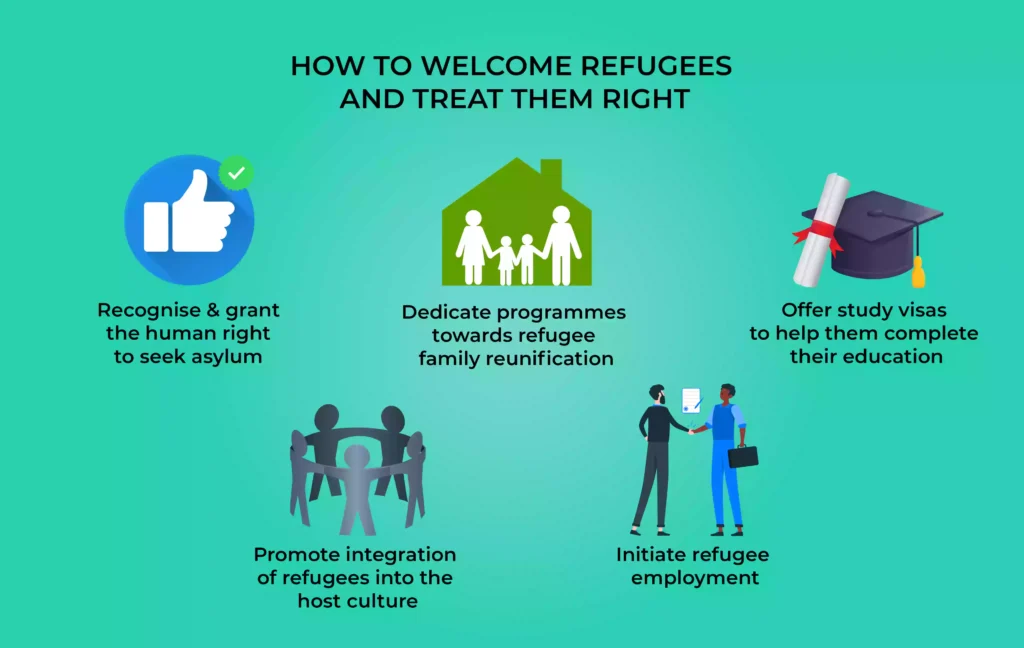
According to the International Rescue Committee, 100 million people are currently displaced worldwide due to disaster and conflict. Irrespective of these mind-blowing numbers, #refugeecrisis never trended as much as #swedengate did at the beginning of June 2022. Why was this hashtag trending? This map was the reason. It highlighted the European countries least likely to show hospitality to guests and caused much furore across certain Reddit, Twitter, and Tumblr circles. It resulted in Scandinavia, and Sweden in particular, getting a great deal of flak. But, what is the connection between the refugee crisis and #swedengate? Well, it’s all about our response to refugees, hospitality, or lack thereof.
#Swedengate or passionate discussion about hospitality?
The map shows that guests in countries such as Sweden, Denmark, Finland, Norway, and others are “very unlikely” to receive any food. Immediately after it was posted, various people began to come forward with their own stories. One user told a tale of playing with his friend as a child. When his friend went to eat, this person was asked simply to wait.
Many people threw their own experiences into the party as #swedengate began to swell. Soon enough, other users started to comment on various platforms expressing how shocked they were at the notion and how this would never happen in their own cultures. In stark contrast to the lack of hospitality mentioned above, many other cultures cook food in plenty on the off chance that guests might drop by. Others would instead go hungry so their guests could eat. Some people even reported that in their culture, guests would not only be fed but often also sent home with extra food packed in containers. They added that it was also customary to include a treat inside the container when you returned it.
The response to this post by people from Sweden was mixed. While some vouched for it immediately, others seemed as though they simply did not understand why this shocked people. One user even went so far as to explain why this happens using the history of Norse culture.
This discussion made me think about hospitality and how we encounter it in our lives. Every culture is different, of course. But in most parts of the world, as a guest, you are likely to receive a warm welcome. People generally take care of and provide for guests generously. However, things tend to go south very quickly when we think of hospitality on a slightly larger scale—a town, a province, or a nation.
Our response to refugees
We often view refugees as inferior beings in one way or another. Through the words we use and the pictures we see and share, we tend to construct an image of this “other” as disease-carrying, dangerous, very unlike ourselves, and possibly even violent. And this is a seemingly universal response. Except for very few countries, most of us feel sorry for refugees but want nothing to do with them.
It doesn’t matter where the refugees are from—Afghanistan, Ukraine, Myanmar, Syria. The minute they are refugees, they instantly become freeloaders who want to take what the host country has. This mindset, often entirely unfounded, can have roots in something innocuous, such as a word used to describe them.
When migrants from Syria and parts of Africa fled to Europe in 2016, then Prime Minister of the UK, David Cameron, described the situation as “a swarm of people coming across the Mediterranean”. Dehumanising much?! It isn’t just one person, though. Several other host countries, mainly influenced by their political leaders, harbour a hostile attitude towards refugees. There are also some curious inconsistencies at play, which perplex me further. For instance, refugees from the Russia-Ukraine conflict met with differing attitudes from host countries. Japan, which is usually reported as keeping its doors only sparingly open for refugees, showed enthusiasm in welcoming Ukrainians fleeing their homeland. On the other hand, the UK fielded criticism for declining refuge to them.
People worldwide tend to be wary of refugees, fearing they might ‘erode a national identity’ or ‘cause social unrest’. Most often, they are afraid that their values will change or they will lose jobs. As a result, they resort to reacting in petty ways.
Germany welcomes the masses…or does it?
New Zealand, Pakistan, and Turkey are a few countries that have welcomed refugees over the last few years. Angela Merkel’s Germany was another. In a highly controversial decision for which she was heavily criticised, the former German Chancellor welcomed refugees from Syria at a time when most of Europe was unwilling.
By the end of 2018, Germany had taken in nearly 1 million people in a few short years. But the same year, the BBC reported stories of people choosing to leave Germany and return to Syria. In this report, Zakariya, a refugee returning home, stated that he had never felt a part of German society. They were Muslims but seen only as terrorists. As a result, they never wanted to return to Germany or Europe because it had no place for them.
Instead, these people would embark on a dangerous journey—at some points illegally and on foot—at the end of which the only thing waiting for them was an active war zone! It speaks volumes about the treatment they received. A state’s policies and its people often have little in common. And this is the case in a country that handled the refugee crisis better than most.

Hostipitality: the actual response to refugees?
Noted French philosopher, Jacques Derrida, speaks about hospitality and the power dynamics between guests and hosts. He also mentions that there is often a little bit of hostility in our hospitality. Unconditional hospitality is simply not possible. We are all human, and we will all grow tired of looking after people from whom we do not consider to be gaining something in return. From this thought, he coined the term “hostipitality”.
I wonder if there isn’t some hostipitality in the world’s response to migrants and refugees.
Nevien Al Rahal: the perspective of a refugee
In 2021, Denmark began ramping up its efforts to send away Syrian refugees who had lived there for a few years. Nevien Al Rahal was one of them. She came to Denmark hoping to bring her family to join her shortly after. However, Denmark is no longer allowing her to stay. She now has two choices: return to Syria or be placed in a deportation facility. In an interview, she expresses her frustration and sadness by asking why the country had welcomed them in the first place if only to turn them away in a few years.
The Danish perspective is that they always intended the refuge to be temporary and that the refugees would eventually have to leave. Nevien simply cannot fathom this as, along with her compatriots, she has been “studying and working” to try and make Denmark her home.
When does a refugee stop being a refugee?
Does the label ever go away? Because that is just what it is. It boils down to the fact that, due to no fault of their own, refugees are only ever identified as that. We never truly see them as one of our own. We give them what they need but not before we demean them to a point where they feel just a little less-than. And for what—escaping a war zone?
There is a world of difference between not serving food to a guest at one’s home and refusing to provide refuge to those fleeing dangerous environments. My intention was never to single out any country or community for anything. However, perhaps it is time we rethink our positions on hospitality and how we view and treat people we view as outsiders. Indeed, there must be a way to help people without humiliating them and making them feel inferior.


